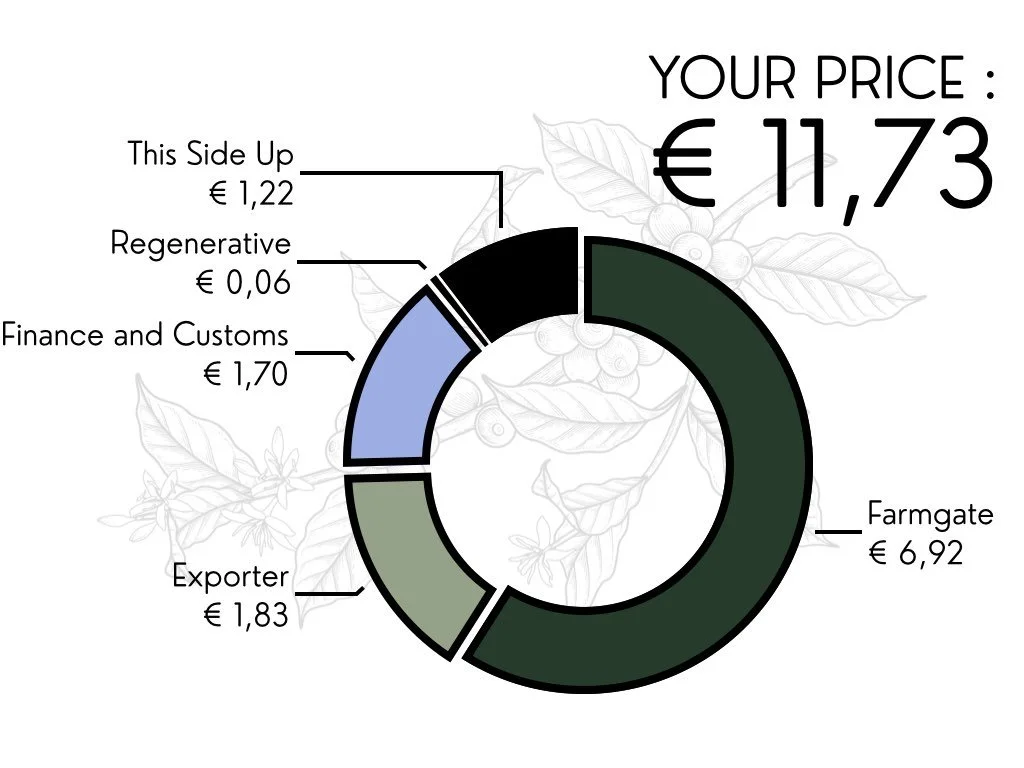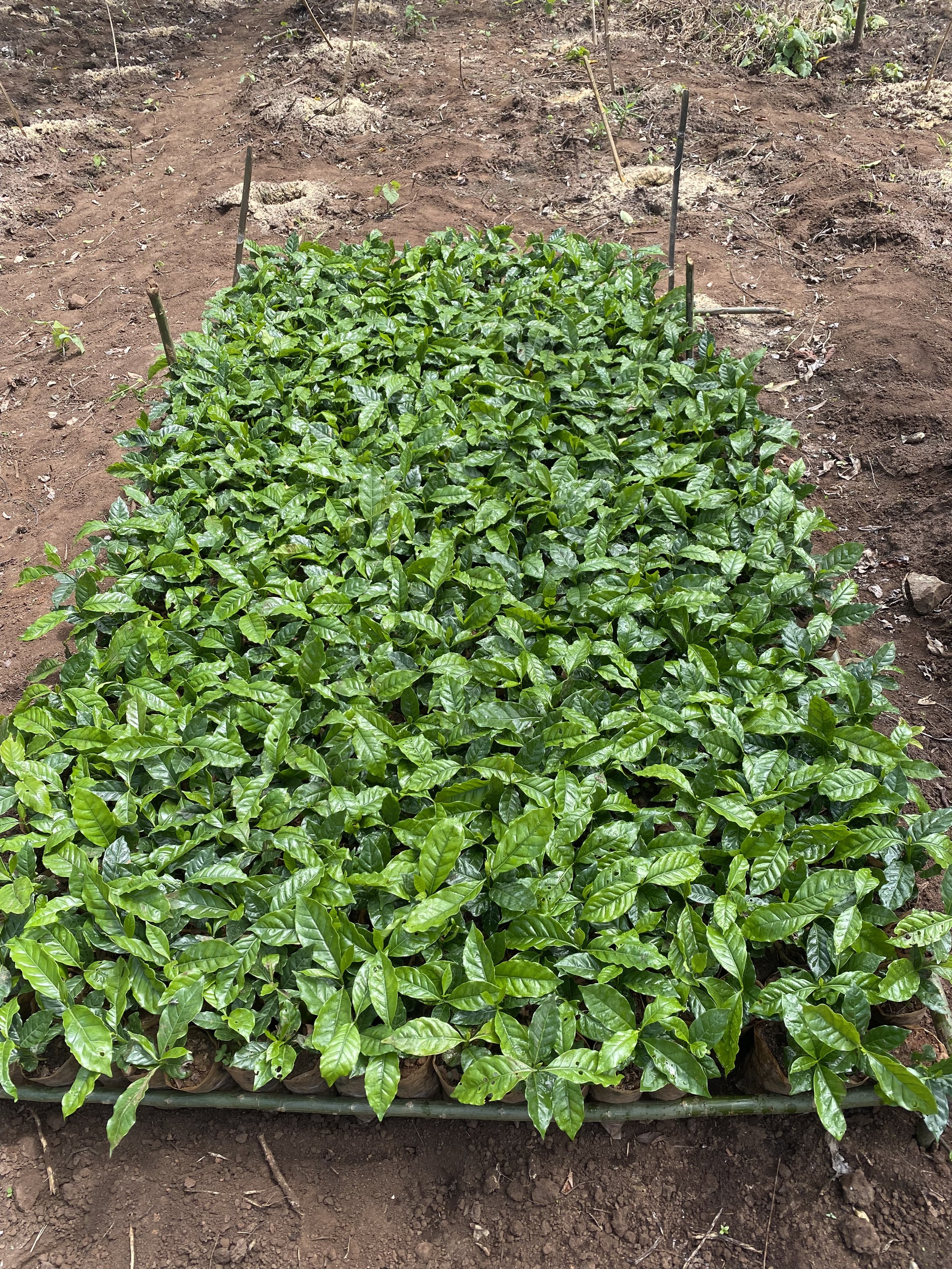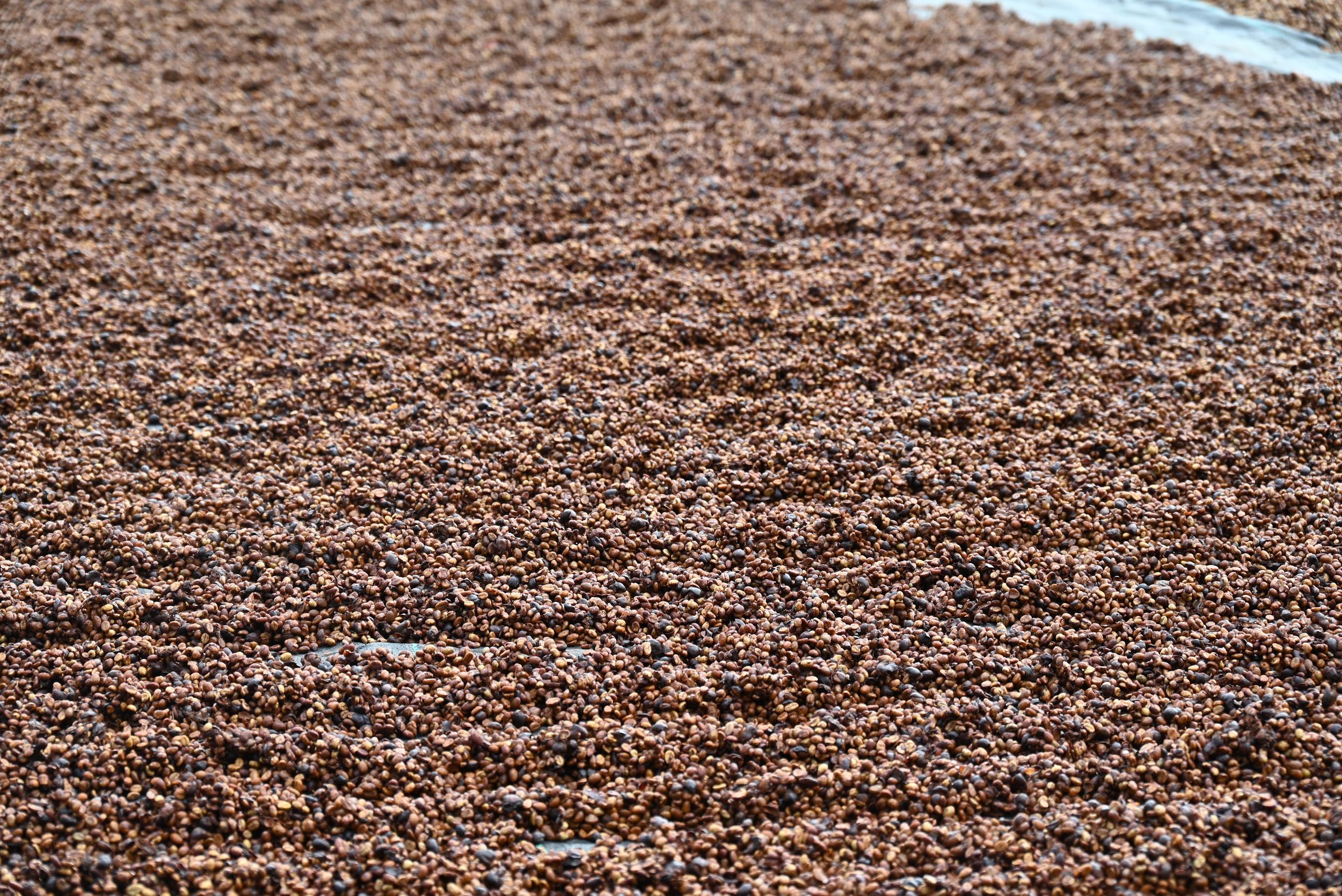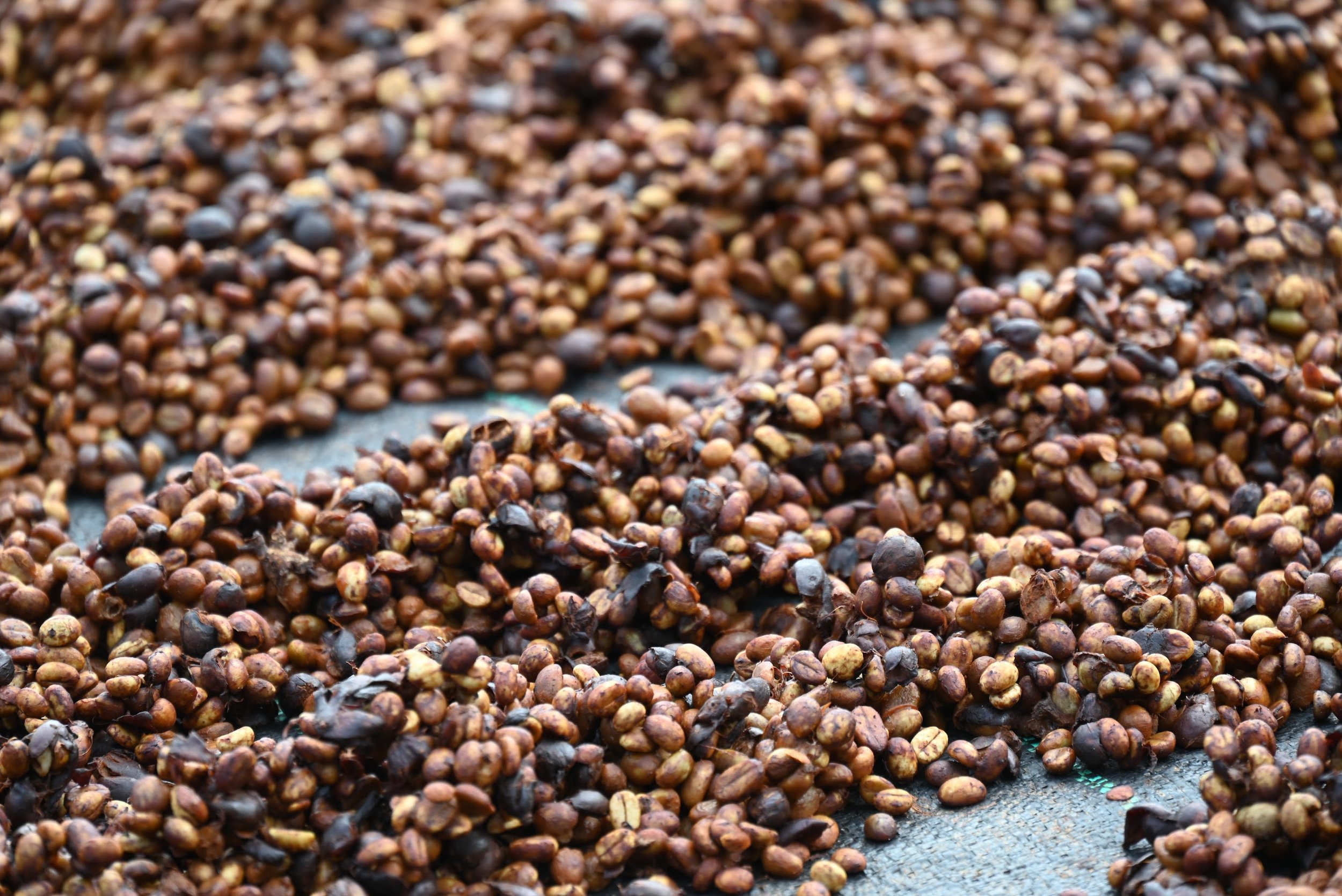reviving coffee with data and other species
Mooleh Manay Estate is managed by Komal and Akshay, taken over from 4th generation coffee planter, Ms. G.G. Padmashree. Mooleh Manay estate is located near the beautiful backwaters of the Harangi Reservoir in Coorg, Karnataka. The producers take a data-driven approach to farming and coffee processing, believing that data is essential for optimizing agricultural practices and ensuring the highest quality coffee production. The farm uses meticulous processing methods and is not afraid to experiment to bring out the best the coffee has to offer.
Excitingly, they are becoming known for their species innovation: by rediscovering native species, introducing other lesser known species and grafting different species onto each other, this farm has a very unique and important role in making coffee climate resilient - for themselves, their community and possibly the world.
-
Excelsa beans are smaller and rounder than their more common counterparts. Local growers often group Excelsa with Liberica under the name "Mara Kaapi," meaning "Tree Coffee" in the local language. This overlooks the subtle differences between the two species.
Traditionally, coffee farms in India planted Excelsa trees along their borders. These trees served a dual purpose: marking the farm's boundaries and providing an additional source of income. However, many farms have removed Excelsa in recent years due to the challenges of harvesting and its susceptibility to berry borer if left unpicked.
SICC, however, see the potential of Excelsa for specialty coffee drinkers. With over 130 Coffea species the focus has primarily been on Arabica and Robusta. Excelsa offers a unique opportunity to explore a new species and new flavour profile.
Notably, Akshay's grandfather-in-law recognized these distinctions and always distinguished Excelsa for its characteristically fruity notes. Interestingly, even when prepared with milk, our traditionally washed (unfermented) Excelsa coffees retain their vibrant fruitiness. We have tested the Excelsa for its caffeine content which is 0.7% - 0.98% which is lower caffeine than Arabica. The most notable difference between Excelsa and the other 2 species is the harvesting. Harvesting Excelsa one needs to climb the tree with the help of a ladder and harvest the fruit from the branches. The sheer size of the tree makes it a challenge to harvest. The information about Excelsa or Liberica remains scarce and it does require further investigation. SICC are actively engaged in research to bridge this knowledge gap and document their own findings.
CULTIVARS
arabica - Chandragiri,
robusta - CxR and Old Peradeniya and
Excelsa
elevation
900 - 1200 meters
NOTABLE
Most farms across Coorg have been growing Excelsa across the boundaries of the farms. This year the Excelsa community naturals were sourced from 4 different farms across Coorg,that included the Srirangalli community.
Available lots:
-
Ripe coffee cherries are hand picked and floated in water to remove floats. Coffee cherries are dried on raised beds for 60 hours. The coffee is then added sealed tanks for a controlled, anaerobic fermentation for 48 hours where a custom yeast culture is introduced to the coffee.
After fermentation, the coffee is transferred to a polyhouse and spread on raised drying beds, raked frequently throughout the drying process until the coffee reaches a specific moisture level. It is then bagged and stored for 2 months before further processing.
-
Ripe cherries are hand picked and floats are removed. Coffee is dried on patio for 15-20 days and is raked frequently to ensure even drying throughout the beans. The drying process is continued until until the coffee reaches a specific moisture level. It is then bagged and stored for 2 months before further processing.
-
Excelsa coffee cherries are harvested by climbing on the tree with ladders. Floats and unripe are removed and cherries are placed in sealed tank for 84 hours. Following fermentation, the cherries are transferred to a polyhouse for drying and raked frequently to ensure consistent moisture loss throughout until desired level is reached. It is then bagged and stored for 2 months before further processing.
-
Cherries are placed in a sealed tanks with a custom yeast culture for 84 hours. Following fermentation, the cherries are transferred to a polyhouse for drying and and raked frequently to ensure consistent moisture loss throughout until desired level is reached. It is then bagged and stored for 2 months before further processing.
-
Ripe coffee cherries are hand picked by climbing on ladders and using flotation lower density coffee is removed. The cherries undergo a drying period around 3 days on raised beds to remove moisture before fermentation. The partially dried cherries then placed in sealed tanks for a controlled fermentation process. They are inoculated with Saccharomyces Cerevisiae Yeast. Ripe coffee cherries are hand picked and floats are removed.
-
Picking only the ripe fruit and removing all the greens. The cherries are then moved to the patios where it is regularly raked and ensures even drying. In the evenings the coffee is covered and opened up in the morning, protecting it from morning mist and unexpected rainfall.
-
The price you pay for Mooleh Manay estate's coffee p/kg. We agreed on this price directly with the farmers, disregarding the volatile US Coffee C price.
-
Here farmgate refers to price paid per kg of green coffee to the farmer by South India Coffee company and in this case constitutes 58% of the total price. Mooleh Manay is the estate owned by the founders of South India Coffee Company - Komal and Akshay. The costs are expected to cover all the production and processing expenses to produce 1 kg of green coffee with specialty standards.
This is for Mooleh Manay Robusta Natural. Other farm gates for the coffees from this farm are :
MOOLEH MANAY ROBUSTA CARBONIC MACERATED NATURAL :€ 7,48
MOOLEH MANAY EXCELSA 84 HOURS CARBONIC MACERATED NATURAL :€ 21,58
MOOLEH MANAY EXCELSA COMMUNITY NATURAL :€ 21,58 -
This includes the exporting cost, SICC margin for their services and CIF costs including customs, insurance and freight. The above costs is for Mooleh Manay Natural Arabica. The costs for other Mooleh Manay coffees are as follows :
Mooleh Manay Estate Natural Robusta : € 0.96
Mooleh Manay Community Lot Natural Excelsa : € 2,16
Mooleh Manay estate lot - 84 hours yeast inoculated natural excelsa : € 2,16
Mooleh Manay estate lot - anaerobic natural excelsa : € 2,16
Mooleh Manay estate lot - natural yeast ferment robusta :€0,74 -
International shipping from Kattupalli, Chennai to Rotterdam, Netherlands. It is exclusive of freight, customs and insurance. It is not represented separately since this was a CIF contract with SICC.
-
Average financing cost owed to (mostly social) lenders. This ensures immediate payment to the farmers when the coffee leaves the farm or port. It also includes the different costs for storage, customs, warehouse and stock surcharge until coffees can be sold.
-
A standard TSU premium on all coffees designated exclusively to accelerate farmers’ own regenerative agriculture project. A suitable regenerative project for the SICC network is currently being planned. Read more about the other regenerative projects done by TSU partners here.
-
This Side Up compensation for spending time and resources importing this coffee. Our work includes year-round contact with producers, managing export, shipping, import, warehousing, grading, sampling, finding and keeping roasting partners for Mooleh Manay. € 1,22 is This Side Up’s Model 1 markup. For a full overview of our modular margin construction, see the Trade Models page
Photo gallery
You may use these images freely to promote Mooleh Manay’s coffee amongst your customers.


















































